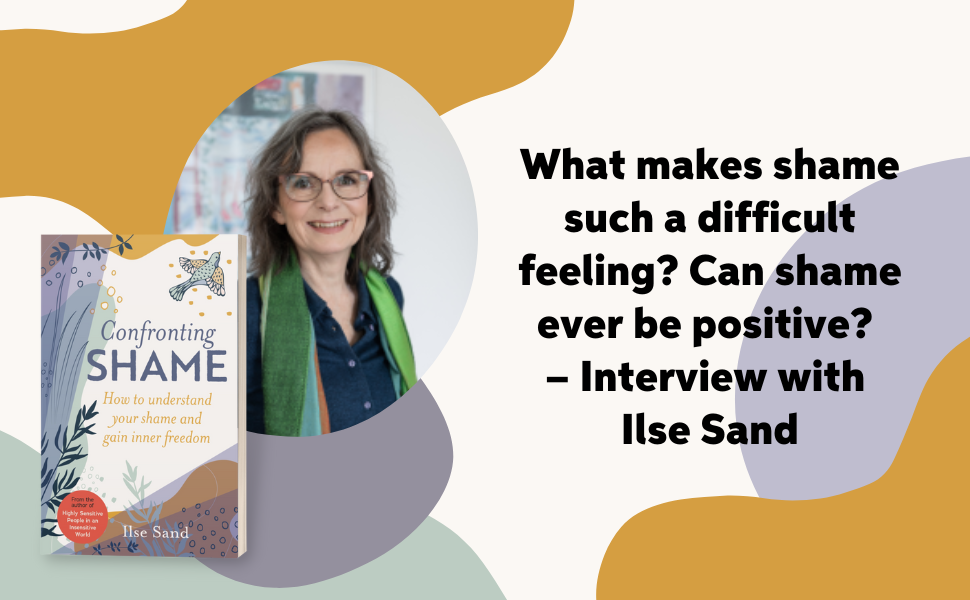
What makes shame such a difficult feeling? Can shame ever be positive? Interview with Ilse Sand
In this blogpost Ilse Sand, author of Confronting Shame, shares her own experiences of shame, diving deep into why it feels just so terrible, and offers a glimmer of hope for shame sufferers.
According to the reference work Den Store Danske Encyklopædi, shame is an emotional reaction to the experience of rejection, ridicule, falling short or loss of reputation. It is a complex, painful feeling that includes embarrassment, humiliation, insult, disgrace and loss of self-esteem.
Ilse Sand knows this herself. In her very personal book Confronting Shame, she tells of an experience when she was in her early 30s, and had started her first job as a pastor, spending time with a group of pastors who were interested in psychotherapy. Here, there was an elderly female pastor who said to her, “you look so fragile”. Ilse had heard that before, and she could not stand it at all. Where she came from, there was no support to be fragile. And she did not dare to examine if there could be anything about what the other pastor was talking about.
“It took me many years to find the courage to investigate and stand by how fragile I am. And when I finally did, I found that the vulnerability that I have been so deeply ashamed of is often something that others value in me.”
What makes shame such a difficult feeling?
The reason why shame is such a difficult feeling is, according to Ilse, that shame is beyond reason:
“You can be ashamed of something that you know with your head is not something to be ashamed of. Yet the shame can manifest itself as the blush and trembling of the hands. That’s what’s so bad about shame. You feel like hiding, but in reality you should do the opposite.”
She explains that shame feels so bad “because it isolates you and makes you lonely. You are completely alone with a secret, and maybe you do not quite know the secret yourself, but you can feel the insecurity. It does not make it any easier that often only confident, eloquent people are highlighted in the media”.
Can shame ever be positive?
Shame can also be positive because it can help you act appropriately in relation to other people. Shame is a sensor, and if it is not exaggerated, it is good because it prevents us from, say, bursting into the toilet occupied by someone else, picking our nose in full public or talking constantly without giving others space.
However, some have a sensor that is exaggerated, and that inhibits them in the company of others. Ilse defines shame as an alarm dating back to life on the savannah, where it was dangerous to be excluded from the group: “Back then it was life threatening. Today we know that one can live 10 years on a desert island without dying, but our brains have not kept up with the times”

The problem is then that some have an overly sensitive shame sensor. They may dare not stand out and express themselves in the same way for fear of being ostracized. It’s scary to be alone.
“It’s not good for a person’s quality of life. What gives us satisfaction is being seen and accepted, just as we are. To feel loved. That someone else can see us with an accepting gaze is a deep longing in all of us. This is how we discover ourselves. So when some people struggle with excessive shame, it comes from not being seen by their primary caregivers, who are typically the parents.”
It is from Ilse’s experience as a priest, psychotherapist and own situations, that’s shown her that when you finally tell others about your shame, you discover that it is not that bad. “It is huge to find out that the world does not go under if someone discovers this about you.”
So, how can shame be healed?
In Confronting Shame, Ilse writes that “shame is healed by being shared”. It’s about identifying what your shame is. For Ilse, it has been good to get an explanation for her insecurity. If one is told what that self-doubt is all about, she thinks it will be a relief for many. Ilse admits that she’s dared “to be open about myself” and that “it’s really good for good relationships. I’m better off.”
What we are typically ashamed of is the feeling of helplessness, vulnerability and lack of control, and one thinks that one is the only one in the world who feels this way. “My experience as a pastor and psychotherapist is that we humans are not that different when you get behind the façade. That’s also why I can talk about my self-insecurity without thinking that I’m the only one in the world who knows about it.”
It has been of great importance to Ilse that she has worked with her own shame and the cause of her self-insecurity.
(Article originally written in by journalist Dorte Remar, in the Danish newspaper Kristeligt Dagblad 28/1/2021)
Ilse Sand’s book Confronting Shame: How to Understand Your Shame and Gain Inner Freedom is available now.
Liked this blog? Why not check out Ilse Sand’s other exclusive JKP blogs: